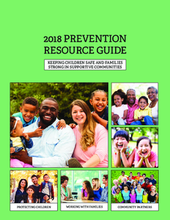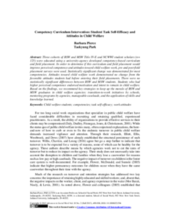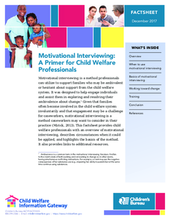Displaying 271 - 280 of 437
This Resource Guide was developed to support service providers in their work with parents, caregivers, and their children to prevent child abuse and neglect and promote child and family well-being.
This comprehensive reference offers a robust framework for introducing and sustaining trauma-responsive services and culture in child welfare systems.
This study evaluated a university-agency developed competency-based curriculum and field placement on child welfare for BSW and MSW students.
This qualitative study explored youth participation from the perspectives of 42 primary foster youth advisory boards facilitators in 34 states in the USA.
This factsheet provides child welfare professionals with an overview of motivational interviewing, describes circumstances when it could be applied, and highlights the basics of the method.
This special report from the Education Commission of the States describes initiatives and policy changes underway in the US that support foster youth in pursuing postsecondary education.
The Government of Yukon, Canada is introducing a new three-year pilot project to reunite families.
Working collaboratively with two state associations and their member (nonprofit) agencies providing out-of-home care to children and youth, University researchers conducted a multi-site project to examine whether there were any differences in individual child-level outcomes between children placed in residential group care and those placed in foster.
This handbook showcases science-based interventions that have been demonstrated effective in promoting attachment security, this is a vital reference and clinical guide for practitioners.
This qualitative study examined caregivers' experiences with SafeCare®, an evidence‐based programme that focuses on child neglect through modules on health, safety, and parenting.




